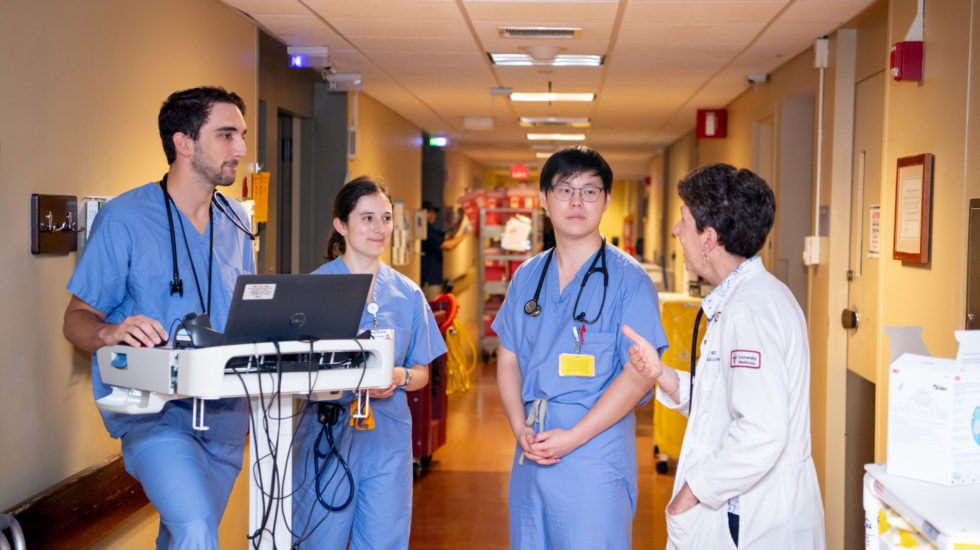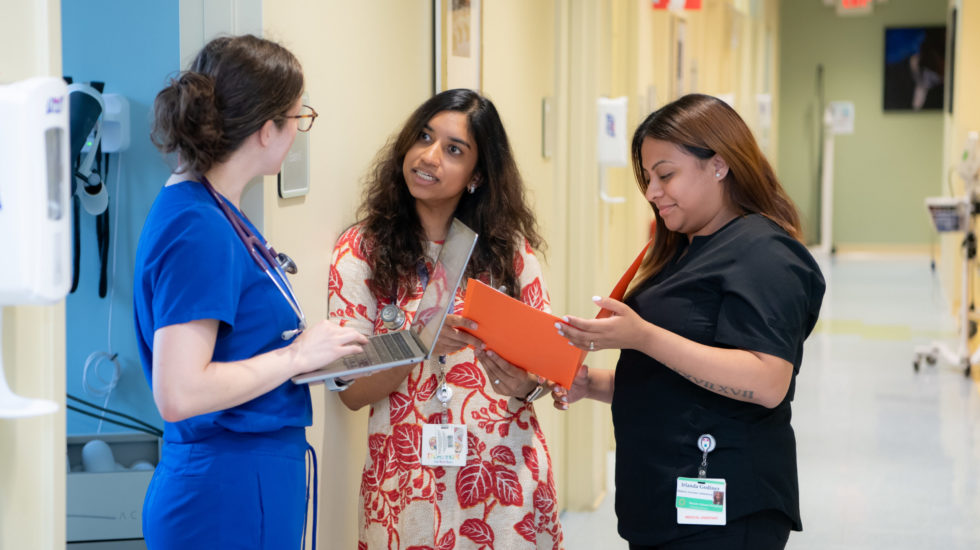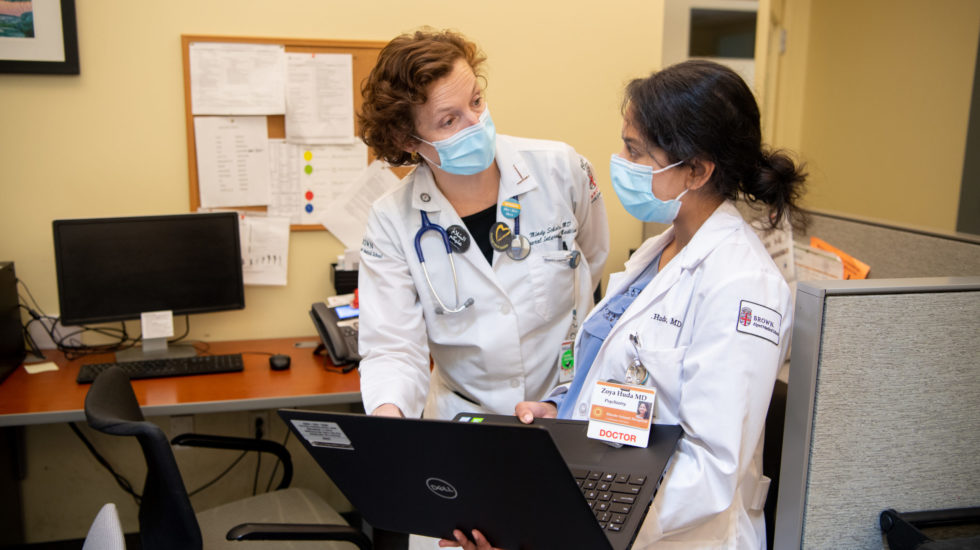Women’s Health Track
This track is designed to prepare residents to be future leaders in clinical and/or academic sex- and gender-based women’s health. We use the term women’s health to describe medical conditions with sex-specific differences affecting people assigned female at birth and are inclusive of patients with diverse gender identities.
Our goals are to enable residents to:
- Understand and manage medical conditions with sex-specific differences affecting people assigned female at birth.
- Acquire competency and expertise in sex- and gender-based women’s health beyond that of a general internist.
- Participate in scholarly work including research projects and curriculum development related to sex- and gender-based women’s health.
- Develop a mentoring relationship with a faculty expert.
News & Events
Meghan Geary delivered an oral presentation at the North American Refugee Health Conference July 2023 Calgary, Canada, titled "Reproductive Healthcare for Refugees: Strategies for access, autonomy, ambivalence".
Meghan Geary, Vidya Gopinath, Mindy Sobota and Ella Satish (a phenomenal MS3) were invited to deliver Rhode Island Hospital Medicine Grand Rounds, titled “Reproductive Health in 2023 for the Rhode Island Internist” (May 2nd, 2023). This was an extension of talks given over the last year by Meghan & Vidya at Medicine Grand Rounds at the Massachusetts General Hospital, the Rhode Island Chapter of the American College of Physicians and the New England Regional Meeting of the Society of General Internal Medicine and by Mindy and Vidya at the Annual Meeting of the Society of General Internal Medicine.Kelly McGarry (outgoing Governor of RI Chapter of ACP) and Dr. Kwame Dapaah-Afriye (incoming Governor of RI Chapter of ACP) supported state legislation that was signed into law allowing Rhode Island state insurance to cover the cost of abortion-related medical care. Mindy Sobota, along with residents Emily Zhou and Olivia Avidan, collaborated with colleagues from the Rhode Island chapters of the American College of Obstetrician Gynecologists and American Family Physicians to send emails, provide testimony, and meet with key state legislators and leaders in support of the abortion coverage bill before the very divided vote.
Mindy Sobota, in collaboration with the Rhode Island Pharmacy Association, testified in favor of another bill that passed, allowing certified pharmacists to prescribe hormonal contraception.
Mindy Sobota, Meghan Geary, Vidya Gopinath integrated the prescribing of mifepristone for medication abortion and miscarriage management at their clinical practice with the support of their family medicine and obstetrician-gynecology colleagues.
Missy McNeil continues to be extremely prolific! She continues to collaborate with colleagues across the country and in Rhode Island, and be an very sought-after invited speaker nationally and locally. See an excerpt from her CV below. We are lucky to have her as an interim co-leader of our women’s health track!
The Environment
Center of Excellence: Brown University researchers, clinicians, and educators at have been leaders in women's health for years and Brown University/Women and Infants' Hospital was designated as one of the 19 National Centers of Excellence (COE) in Women's Health. Although the national centers no longer formally exist, the Brown Internal Medicine Residency Women’s Health Track was created through this lens. We continue to develop, including a focus on the health care of sexual and gender minorities assigned female at birth.Resources in Research: Women's health focused research occurs at Brown University and its affiliated hospitals and centers, including Rhode Island Hospital, the Miriam Hospital, Women & Infants' Hospital. The research represents a broad range of investigation including the disproportionate effects of alcohol and other addictive substances, depression, HIV, breast and gynecologic malignancies, osteoporosis, menopause, obesity, pregnancy, contraception, abortion, and reproductive justice.
Clinical Resources:The training program is part of a robust care service network. There are multiple internal medicine practice sites providing sex- and gender-specific women’s health care, including: 1) our faculty-resident academic practices that includes a reproductive & gender affirming health clinic and refugee health clinic 2) faculty practices providing comprehensive women’s health care 3) academic practices specializing in obstetric medicine.
In addition to these internal medicine sites, there are additional clinical opportunities for women’s health track residents in breast health, gynecology, reproductive endocrinology, urogynecology, and psychiatric services for women, student health, cardiology and neurology, There is an obstetric medicine fellowship at Women and Infants' Hospital that is a month-long rotation for residents.
The internal medicine residency's largest resident/faculty practice, the Rhode Island Hospital Center for Primary Care, has a Reproductive and Gender Health Clinic where women’s health track residents can rotate to gain competency in pelvic examination, procedures such as insertion and removal of IUDs and contraceptive arm implants, medication abortion and gender affirming care.
Advocacy: Women’s health faculty are active in advocacy through the American College of Physicians and the Reproductive Health Access Project. State-based advocacy has been successful, with the passage of legislation to legalize and protect abortion rights (2019), require state insurance to cover birthing doulas (2021), eliminate a ban on the use of state funds to pay for abortion (2023) and allow pharmacists to prescribe hormonal contraception (2023). The Rhode Island Department of Health has opportunities for physician advocacy including the establishment of a Maternal Mortality Review Commission to study maternal health outcomes.
How would my curriculum differ from other General Internal Medicine Residents?
The Women's Health Track will differ from the traditional General Internal Medicine (GIM) Residency program by the addition of 5 key components to further excellence in women's health: Mentorship, Research, Clinical Experience, Clinical Competence, and Didactics/Education. The majority of the women's health training will take place during ambulatory block.- Mentorship
A faculty mentor will be assigned to each resident at the beginning of their PGY-2 year. Mentors will provide help with choosing women's health clinical sites, preparing for didactic sessions, identifying research mentors, if desired, and identifying each resident's present and future goals with respect to a career in internal medicine and women's health. Residents will meet at least twice yearly with their mentors. - Scholarship
Beginning early in their PGY2 year, residents will meet with their mentor to discuss clinical interests and potential scholarly opportunities. Scholarship can be conducted throughout the PGY-2 and PGY-3 year, and residents may have up to 2 months in their PGY-3 year dedicated to research, if desired. Residents are encouraged to submit their scholarship to be presented at a regional and/or national meetings. - Clinical Experience
The following clinical experiences are available to our women’s health track residents:Residents will have continuity clinic in a site with attendings skilled in providing gender-focused primary care.
At the end of internship, residents will choose a women’s health focused "2nd site" for clinic, which can be based in primary care or sub-specialty medicine. Second site occurs one half-day/week throughout their PGY-2 and PGY-3 years.
During PGY2/3 years, residents will complete an elective in women's health and/or obstetric medicine.
Residents are encouraged to choose from a directory of gender-focused clinical experiences to tailor their ambulatory and/or elective rotations. Our strengths include refugee health, addiction medicine and reproductive & gender-affirming care. We are one of the only US internal medicine residencies that can train residents to competency in both advanced contraception procedures (subdermal implants and IUDs) and medication abortion.
- Clinical Competence
We structure the women’s health track to graduate residents with clinical competencies as outlined by the Society of General Internal Medicine, including:
breast cancer screening guidelines and risk reductioncardiovascular disease prevention/risk reduction
cervical cancer screening and screening options 4
endometrial and ovarian cancer risk reduction
contraception counseling, including emergency contraception
preconception care
pregnancy options
intimate partner and family violence, history of trauma
menopausal symptoms and hormonal/non-hormonal management options
osteoporosis screening and treatment recommendations
urinary incontinence screening and treatment options
gender-affirming treatment options
- Didactics/Education
The Women’s Health Seminar series meets monthly and aims to provide clinical content, collegiality and mentorship.
In their PGY2/3 years, residents will develop and lead a total of 2 didactic sessions on a topic of their choice.Residents can choose from additional didactics offered by the Dean for Women in Medicine, the RI Department of Public Health, Office of Women's Health and the Brown University School of Public Health.
- Mentorship
How do I apply to the Women's Health Track?
The track is open to any resident in the internal medicine residency program at the end of their PGY1 year. Applicants may specify the desire to participate in the track when applying to the residency program as well.Who are the Core Faculty in the Women's Health Track?
Melissa McNeil, MD MPH MACP
Interim Co-Director
Professor of Medicine, Clinician Educator Track
Alpert Medical School of Brown University
Email: Email
Mindy Sobota, MD MS MPhil FACP
Interim Co-Director
Procedural Director
Associate Professor of Medicine, Clinician Educator Track
Alpert Medical School of Brown University
Email: EmailIris Tong, MD
Clinical Director
Associate Professor of Medicine, Teacher-Scholar Track
Alpert Medical School of Brown University
Email: EmailMeghan Geary, MD
Care of Vulnerable Populations Director
Assistant Professor of Medicine. Clinician Educator Track
Alpert Medical School of Brown University
Email: EmailAdditional Faculty:
Michelle Anvar, MD
Stephanie Braunthal DO
Christine Duffy, MD MPH
Laura Edmonds, MD
Jennifer Jeremiah, MD
Lucia Larson MD
Nancy Lasson DO
Leah Marano MD
Peg Miller MD
Nika Meta MD
Kelly McGarry, MD
Lauren Schlanger MD
Mariah Stump MD MPH
Amelia Tajik MD
Noor Tell MDRecent Women's Health Track Resident Presentations
Zain Alfanek & Manasa Srivillibhuthur, MD
“Gender affirming care” – Delivered to Women’s Health Summit half day and in pre-clinic conferenceCharity Sylvester
“Plan A: making medication abortions accessible to patients in the primary care setting”. Oral Presentation, Society of General Internal Medicine Annual Meeting, Aurora Colorado. Also delivered to the Women’s Health Track Summit, June 2023.
Leanne Duge, MD
“Breast cancer screening” - Delivered to the General Medicine residents
“Polycystic Ovarian Syndrome” – Delivered to the General Medicine residents
Ashley Nguyen, MD
“Allergy and women’s health” - Delivered to the General Medicine residents
“Adolescent women’s health” - Delivered to the General Medicine residents
Lakshmi Ravindra MD
“Diabetes in pregnancy” – Delivered to General Medicine Residents
“Secondary osteoporosis” - Delivered to the General Medicine residents
Julia Solomon MD
“Pearls for trauma-informed care” - Delivered to the General Medicine residents
“RI after Roe” - Delivered to the General Medicine residents
Amelia Tajik, MD
"A Case of Extensive Venous Thromboembolism after initiation of Combined Oral Contraceptives for Treatment of Menorrhagia in a patient with Undiagnosed May Turner Syndrome".
“Abnormal uterine Bleeding”, Pre-clinic curriculum
“Menopause”, Pre-clinic curriculum
Noor Tell, MD
“Pelvic floor disorders” - Delivered to the General Medicine residents








